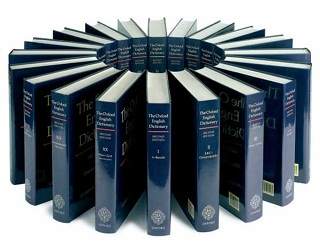With Wikipedia, Dictionary.com, and, well, the rest of the entire Internet, who needs a physical dictionary anymore? Apparently not enough people to actually make the next version of the Oxford English Dictionary go to the printers.
The Oxford English Dictionary, as legendary as it is heavy, is facing a bleak future as there’s not much of a market these days for a reference book that weighs 130 pounds.

The dictionary’s publisher, Oxford University Press, said that the OED’s online version gets two million hits a month. And that’s from users who pay $295 a year to be able to access the exhaustive word list.
The OED has been around since 1884 and in that time has come to be the most definitive name in lexicography. Work is currently underway on a sweeping overhaul of the dictionary for the third edition. That’s right – the Oxford English Dictionary is only officially in its “second edition” after 126 years. Updates are made every year but the presentation of the dictionary has changed very little over the decades.
“A print version will certainly be considered if there is sufficient demand at the time of publication,” wrote the publisher in a statement. However, “The print dictionary market is just disappearing. It is falling away by tens of percent a year.”
The digital market is thriving, though, as many users have online dictionaries as part of the requisite list of bookmarked websites. In a way, it may be good for the OED, which has historically remained a library artifact or a status symbol for the cultural elite.
“Few people own the full version so maybe now that it is online more people can gain access to it,” said OED consultant Ben Robinson in an AP story.
The next thing to worry about is when nobody cares about correct spelling anymore and can just post random words on their blog without any sort of spell check. Oh, wait. Yeah, we’re there already.






